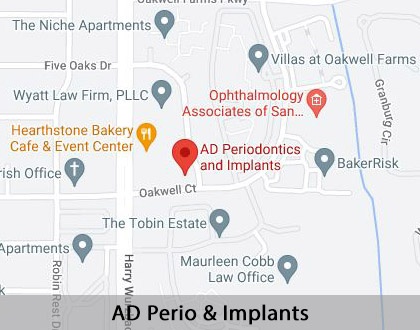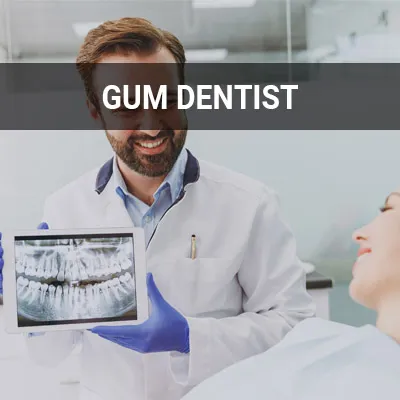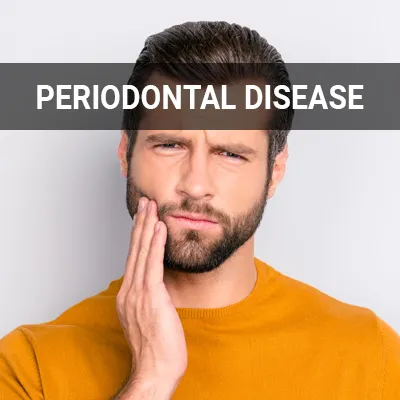Gingivitis San Antonio, TX
Gingivitis is a common and mild form of periodontal disease that is often reversible in its early stages. However, if not treated promptly, gingivitis may lead to more serious gum disease and tooth loss. Patients should seek a periodontist's help as soon as they recognize the signs and symptoms of gingivitis.
Gingivitis treatment is available at AD Perio & Implants in San Antonio and the surrounding area. Do not wait until it is too late. Call us today at (210) 805-8400 to schedule an appointment or learn more about our services.
What Is Gingivitis?
According to the Mayo Clinic, gingivitis is a common, mild form of periodontal disease. It causes irritation, redness, and swelling of the gingiva. The gingiva is the part of the gum surrounding the base of the teeth. If left untreated, gingivitis may give way to periodontitis and even tooth loss. As such, it is imperative to seek professional treatment for gingivitis right away.
Almost half of all U.S. adults aged 30 and older suffer from some form of gum disease, with this figure only increasing with age. The condition tends to be more common in men than in women. It also tends to occur more frequently in those living below the federal poverty line, those with less than a high school education, and current smokers.
“According to the Mayo Clinic, gingivitis is a common, mild form of periodontal disease.”
Common Causes of Gingivitis
Gingivitis is most commonly caused by poor oral hygiene, which encourages plaque to form on the teeth. This, in turn, causes inflammation of the surrounding gum tissues. First, plaque (an invisible, sticky film made up primarily of bacteria) forms on the teeth. This is often due to starches and sugars in the food interacting with bacteria typically found in the mouth. Since it re-forms quickly, plaque requires daily removal.
Leaving plaque on the teeth can allow it to harden under the gum line and turn into tartar, also known as calculus. This substance collects bacteria and is more difficult to remove, essentially protecting the bacteria and causing irritation along the gumline. Only a professional dental cleaning can remove tartar. Eventually, the gingiva will become inflamed, leading to gingivitis. The gums will become swollen and prone to bleeding, and dental caries may also result. Left untreated, the patient may also develop periodontitis or even lose a tooth.
“Gingivitis is most commonly caused by poor oral hygiene, which encourages plaque to form on the teeth.”
Symptoms of Gingivitis
According to MedicalNewsToday, patients with mild cases of gingivitis often experience little to no symptoms at all — making it a silent disease. However, those who do undergo symptoms may notice the following:
- Bad breath, also known as halitosis
- Bleeding from the gums when brushing or flossing
- Bright red or purple gums
- Receding gums
- Soft gums
- Swollen gums, also known as inflammation
- Tender gums that may be painful to the touch
Patients who notice any of the above should be sure to schedule an appointment with their periodontist right away, as gingivitis is often reversible in its early stages.
“According to MedicalNewsToday, patients with mild cases of gingivitis often experience little to no symptoms at all — making it a silent disease.”
Check out what others are saying about our dental services on Yelp: Gingivitis in San Antonio, TX
Risk Factors for Gingivitis
Anyone can develop gingivitis, especially those with poor oral care habits. However, other risk factors include the following:
- Certain drugs
- Certain medical conditions
- Conditions that decrease immunity
- Dental restorations that do not fit properly or crooked teeth that are difficult to clean
- Dry mouth
- Genetics
- Hormonal changes
- Older age
- Poor nutrition, including vitamin C deficiency
- Smoking or chewing tobacco
“Anyone can develop gingivitis, especially those with poor oral care habits.”
Questions Answered on This Page
Q. What are some of the symptoms of gingivitis?
Q. What are some risk factors for gingivitis?
People Also Ask
Q. What conditions require gum medication?
Q. What are the common causes of periodontal disease?
Q. What are the symptoms of oral inflammation?
Gingivitis Treatment
If the condition is diagnosed early on, it is often possible to reverse gingivitis. In such cases, a periodontist will remove the plaque and tartar with a process known as scaling and root planing. It may be an uncomfortable procedure for the patient, especially if they have excessive tartar buildup or their gums are particularly sensitive. Depending on the extent of the disease, follow-up appointments and more frequent cleanings may be necessary. We may also need to fix any damaged teeth to promote a patient's overall oral hygiene.
At home, patients need to brush at least twice daily and floss once nightly. Many people may also benefit from using an electric toothbrush and rinsing regularly with an antiseptic mouthwash. Additionally, those who smoke or chew tobacco are advised to quit.
“Depending on the extent of the disease, follow-up appointments and more frequent cleanings may be necessary.”
Frequently Asked Questions
Q. Are there different stages of gum disease?
A. Yes. There are three different stages of gum disease: gingivitis, periodontitis, and advanced periodontitis. More advanced periodontal disease requires more complex treatment.
Q. What are some potential complications of gingivitis?
A. With professional treatment, gingivitis can typically subside without complications. However, potential complications include abscess or infection in the gingiva or jaw bone, periodontitis, recurrent gingivitis, and trench mouth. There is also a link between gum disease and cardiovascular disease.
Q. What are the two main categories of gingival disease?
A. The two main categories of gingival disease are dental plaque-induced gingival disease and non-plaque induced gingival lesions. Dental plaque-induced gingival disease may be caused by malnutrition, medications, plaque, and systemic factors. In comparison, non-plaque induced gingival lesions may be caused by a specific bacterium, fungus, or virus. They may also be caused by genetic factors, systemic conditions, wounds, reactions to foreign bodies, or even for no apparent reason.
Q. How is gingivitis diagnosed?
A. A periodontist can check for symptoms, including plaque and tartar in the oral cavity. They may also check for signs of periodontitis. We may use X-rays or periodontal probing to do so.
Q. How can I prevent gingivitis?
A. Good oral hygiene is the number one way to prevent gingivitis, as are good overall health practices. Regular dental visits also help — generally at least twice yearly. However, some people may require more or less frequent visits.
Start Feeling Better – Visit Us Today
By visiting us as soon as possible, our team can help get you the professional treatment you need. Instead of waiting around and allowing the symptoms to get worse, we can provide you with treatment options.
Definitions
Call Us Today
Do not let gingivitis turn into periodontitis. Let us at AD Perio & Implants help you. Call us today at (210) 805-8400 to schedule an appointment or learn more about our services.
Helpful Related Links
- American Academy of Periodontology (AAP). American Academy of Periodontology (AAP). 2023
- Center for Disease Control and Prevention (CDC), Periodontal Disease Page. Center for Disease Control and Prevention (CDC), Periodontal Disease Page. 2023
- WebMD, What Is a Periodontist?. WebMD, What Is a Periodontist?. 2023
- AD Perio & Implants was established in 2020.
- We accept the following payment methods: American Express, Cash, Check, Discover, MasterCard, and Visa
- We serve patients from the following counties: Bexar County, Kendall County, Comal County, and Guadalupe County
- We serve patients from the following cities: San Antonio, Alamo Heights, Terrell Hills, Universal City, Boerne, Stone Oak, New Braunfels, Bulverde, Fair Oaks Ranch, Garden Ridge, Selma, and Castle Hills
- Norton Safe Web. View Details
- Trend Micro Site Safety Center. View Details
About our business and website security
Back to top of Gingivitis







